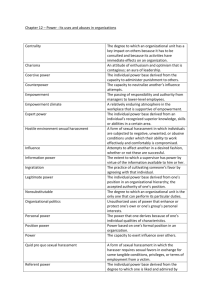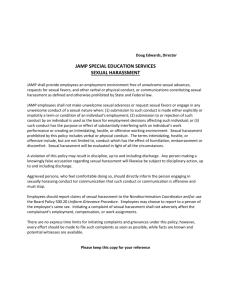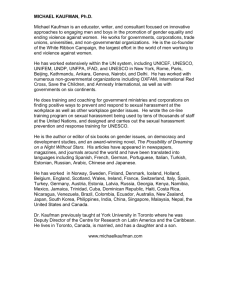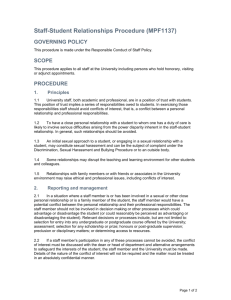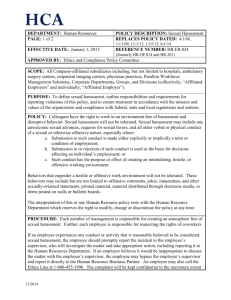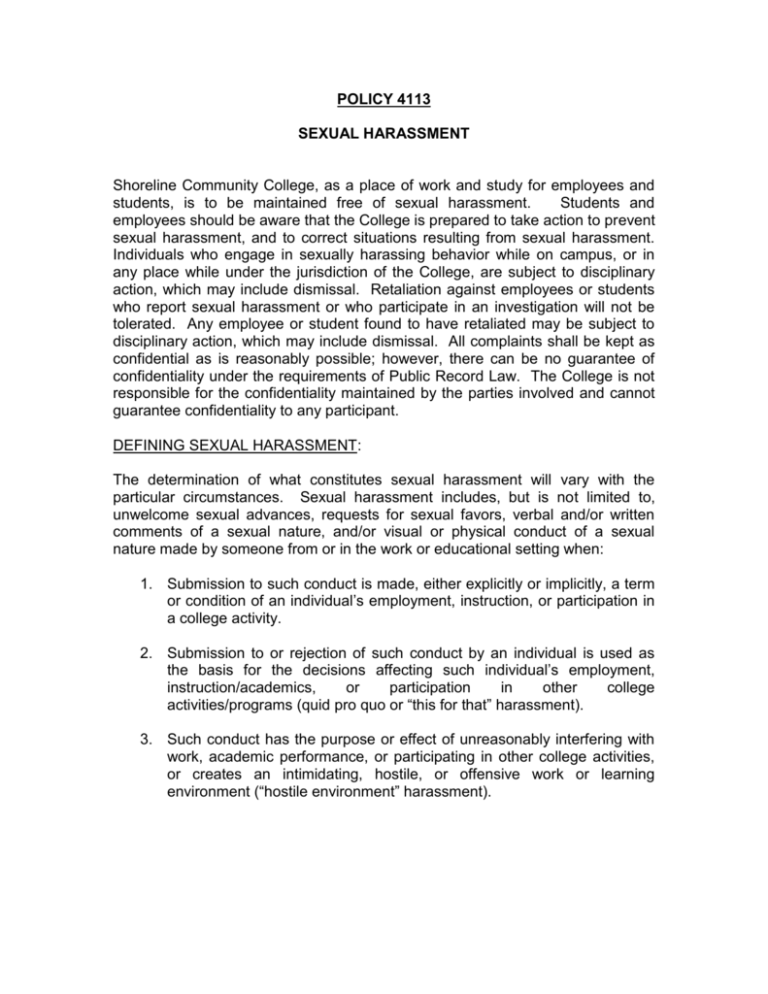
POLICY 4113
SEXUAL HARASSMENT
Shoreline Community College, as a place of work and study for employees and
students, is to be maintained free of sexual harassment.
Students and
employees should be aware that the College is prepared to take action to prevent
sexual harassment, and to correct situations resulting from sexual harassment.
Individuals who engage in sexually harassing behavior while on campus, or in
any place while under the jurisdiction of the College, are subject to disciplinary
action, which may include dismissal. Retaliation against employees or students
who report sexual harassment or who participate in an investigation will not be
tolerated. Any employee or student found to have retaliated may be subject to
disciplinary action, which may include dismissal. All complaints shall be kept as
confidential as is reasonably possible; however, there can be no guarantee of
confidentiality under the requirements of Public Record Law. The College is not
responsible for the confidentiality maintained by the parties involved and cannot
guarantee confidentiality to any participant.
DEFINING SEXUAL HARASSMENT:
The determination of what constitutes sexual harassment will vary with the
particular circumstances. Sexual harassment includes, but is not limited to,
unwelcome sexual advances, requests for sexual favors, verbal and/or written
comments of a sexual nature, and/or visual or physical conduct of a sexual
nature made by someone from or in the work or educational setting when:
1. Submission to such conduct is made, either explicitly or implicitly, a term
or condition of an individual’s employment, instruction, or participation in
a college activity.
2. Submission to or rejection of such conduct by an individual is used as
the basis for the decisions affecting such individual’s employment,
instruction/academics,
or
participation
in
other
college
activities/programs (quid pro quo or “this for that” harassment).
3. Such conduct has the purpose or effect of unreasonably interfering with
work, academic performance, or participating in other college activities,
or creates an intimidating, hostile, or offensive work or learning
environment (“hostile environment” harassment).
TYPES OF SEXUAL HARASSMENT:
1. Quid Pro Quo
Quid pro quo, “this for that,” can occur through improper sexual
advances, requests for sexual favors, and other unwelcome verbal or
physical conduct of a sexual nature which involves coercion.
Specifically, coercive behavior, including suggestions that academic or
employment reprisals or rewards will follow the refusal or granting of
sexual favors, constitutes gross misconduct and will not be tolerated. In
such cases, a single incident of behavior involving pressure or coercion
would establish grounds for disciplinary action.
2. Hostile Environment
Hostile environment can occur through the repetition of offensive
behavior that creates a hostile, intimidating, or offensive work or learning
environment.
A third party who is not the target of sexual harassment can make a
claim for sexual harassment if adversely affected by the harassment.
This can occur in both quid pro quo or hostile environment harassment
situations.
Conduct may amount to sexual harassment either because it is sexual in nature
and/or because it is related to the gender of the person toward whom the conduct
is directed.
BEHAVIORS THAT MAY CONSTITUTE SEXUAL HARASSMENT:
Behaviors that may constitute sexual harassment include but are not limited to
actions described by the complainant as:
Physical aggression on a continuum from deliberate unwelcome brushes or
touches, pinching, patting or grabbing to the extreme of touching intimate
body parts;
Any type of pressure for sexual activity;
Unwelcome verbal sexual advances;
Repeated and unwelcome sexually offensive
communications including those portrayed as humor;
remarks
or
written
Repeated and unwelcome offensive, disparaging remarks or written
communications about one’s gender;
Repeated, unwelcome, and inappropriate sexual innuendos including
obscene gestures.
FACTORS TAKEN INTO ACCOUNT IN DETERMINING WHEN OR WHETHER
AN INCIDENT CONSTITUTES SEXUAL HARASSMENT:
A number of factors must be taken into account when considering whether or not
an incident constitutes sexual harassment, including but not limited to:
SEVERITY OF THE CONDUCT: Generally behaviors can be placed along a
continuum ranging from mild to severe. While no hard lines can be drawn,
general groupings can be made. For example, behavior involving touching
will generally be considered more severe than strictly verbal harassment.
NUMBER AND FREQUENCY OF ENCOUNTERS: The number of incidents
and the time span between each is important. What seems less severe
when happening only once may become more serious when repeated often
and with persistence.
APPARENT INTENT OF THE ACCUSED HARASSER: Actual or apparent
intent is irrelevant.
PERCEPTION OF THE COMPLAINANT: The perception of the complainant
is a matter of serious consideration. In determining whether the harassment
is sufficiently severe or pervasive enough to create a hostile environment, the
alleged harasser’s conduct should be evaluated from the objective standpoint
of a reasonable person.
CONTEXT OF THE ALLEGED INCIDENT(S): Consideration shall be given
to the pedagogical nature of the educational environment, realizing that
controversial issues may be discussed in the classroom setting that may be
viewed as potentially intimidating or offensive outside of the classroom.
RELATIONSHIP OF THE TWO PARTIES: The interpersonal relationship
may be considered in terms of the power differential. What may be
permissible behavior
from a peer or another student may be considered inappropriate and more
serious if a person has some authority or power over the complainant.
COMPLAINANT’S RESPONSIBILITY: It is generally assumed that the
complainant has some responsibility to indicate the behavior is unwelcome.
This responsibility makes more sense when considered in light of the severity
of the conduct directed towards the complainant. The more severe the
conduct, such as forced fondling or attempted rape, the less responsibility
the complainant has to express objection. The milder the conduct, such as
jokes or teasing, the more responsibility the complainant has. This factor
should be weighed appropriately since many complainants are afraid to
respond directly to the alleged harasser, especially when the offending party
is a supervisor, faculty member, well-liked co-worker, or popular student.
COLLEGE GOALS:
Nothing in this policy shall be construed to abridge any employee’s rights and
entitlements under existing employment contracts or agreements nor any
student’s rights under existing college policies.
The best tool for the elimination of sexual harassment is prevention through
training and education designed to eliminate sexual harassment. Therefore, the
college shall provide to employees and students, as feasible, educational
materials on sexual harassment. The College shall also require and provide
training and education for its permanent employees on a regular basis.
Temporary and/or hourly employees shall be provided sexual harassment
information, as feasible, and will be notified about on-going training sessions.
Approved by:
College Cabinet ....................................................................... 11/14/89
Revised ................................................................................... 04/05/94
Revised ................................................................................... 01/09/96
Revised ................................................................................... 05/07/96
Board of Trustees .................................................................... 12/14/89
Revised ................................................................................... 04/15/94
Revised ................................................................................... 06/21/96
PROCEDURAL GUIDELINES
1. Complaint Procedures Concerning Sexual Harassment for Students and
Employees of Shoreline Community College:
The most current Shoreline Community College Human Rights Universal
Complaint Procedure is to be utilized.
2. External Complaint Procedures Concerning Sexual Harassment for Students
and Employees of Shoreline Community College:
Inquiries or complaints may be made to the Equal Employment Opportunity
Commission* (federal agency), the Human Rights Commission** (state
agency), the U.S. Department of Education Office for Civil Rights*** (federal
agency) or any other agency with the jurisdiction to hear such complaints.
_______________________
* Equal Employment Opportunity Commission
Seattle District Office
909 First Avenue, Suite 400
Seattle, WA 98104-1061
Phone: 206-220-6883
** Human Rights Commission
Melbourne Tower, 9th Floor
1511 Third Avenue, Suite 921
Seattle, WA 98101-1626
Phone: 206-464-6500
*** U.S. Department of Education
Office of Civil Rights
915 Second Avenue, Room 3310
Seattle, WA 98174-1099
Phone: 206-220-7900
The above agencies have deadlines for reporting incidents of sexual harassment.
As of November 1995, complaints were required to be reported within 6 months
or 180 days from the most recent incident. To obtain information regarding the
current deadlines, the complainant should contact the above agencies or
Shoreline’s Human Rights Officer.



